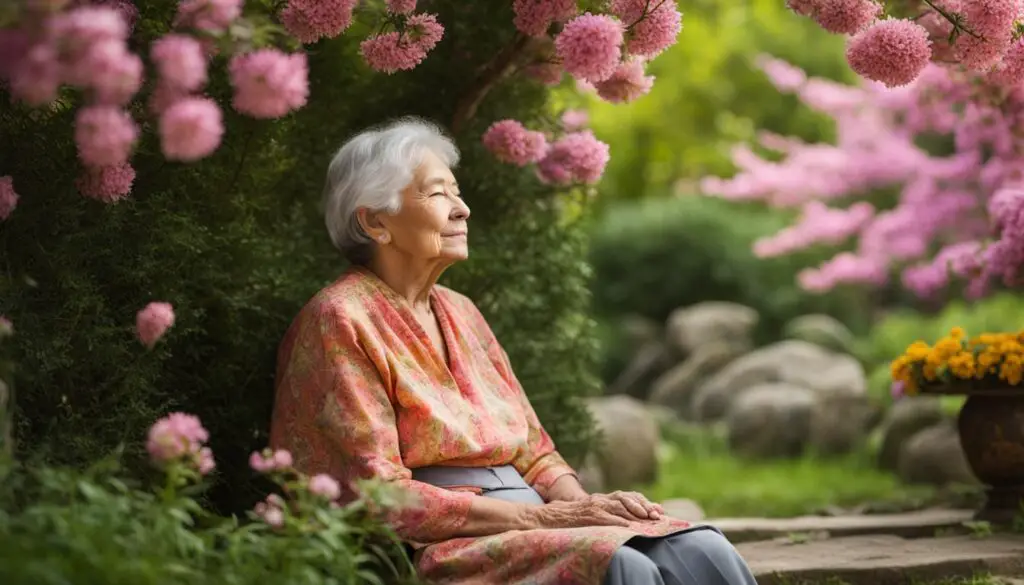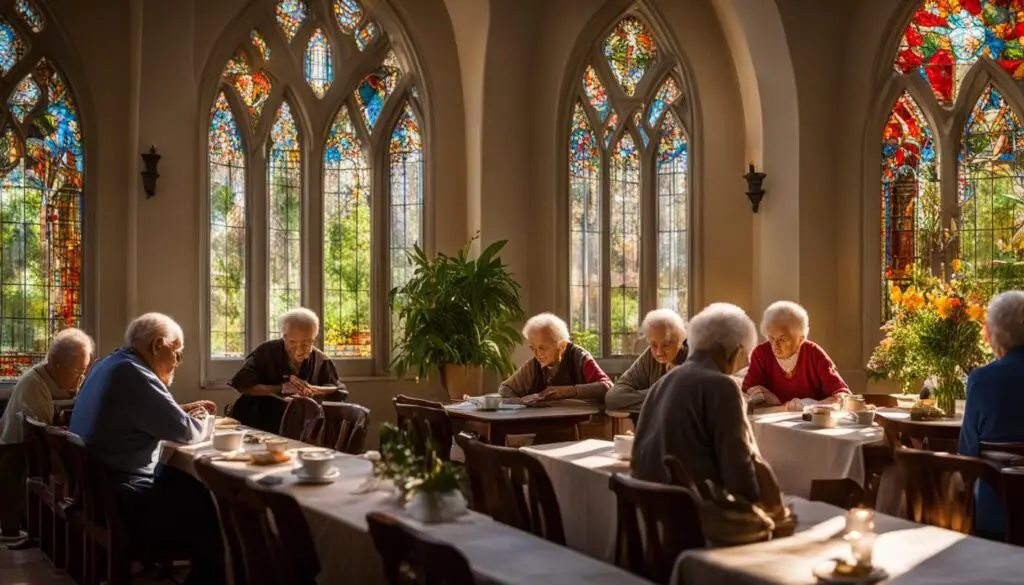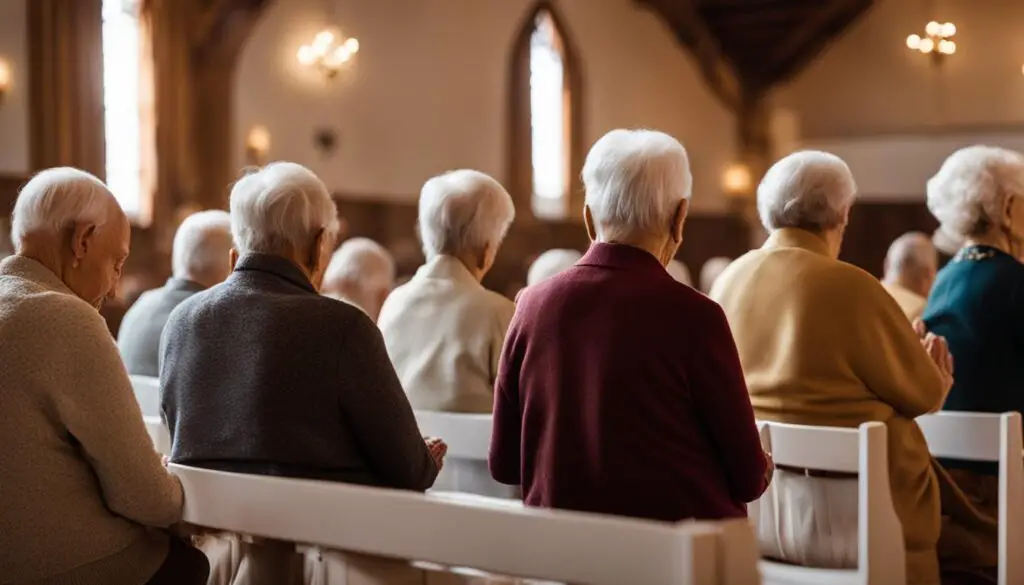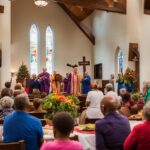Spiritual wellness is an integral part of life, shaping our physical, mental, and social well-being. As we age, it becomes even more crucial to engage in religious activities and spiritual practices that bring us peace, joy, and a sense of purpose.
Studies have shown that highly religious individuals tend to report higher levels of happiness and satisfaction with life. Attending religious services has also been linked to increased longevity. Moreover, spirituality can help ward off depression and strengthen our relationships, both with ourselves and with others.
For older adults, finding solace in religious events can be a transformative experience. Whether it’s participating in faith-based programs, engaging in spiritual activities, or connecting with a like-minded community, these endeavors can nourish the soul and enhance overall well-being.
Join us on this journey as we explore the various aspects of religious activities for the elderly, discover the benefits they bring, and learn how to incorporate spiritual wellness into our lives.
Key Takeaways:
- Engaging in religious activities can bring peace, joy, and a sense of purpose to the lives of older adults.
- Highly religious individuals tend to report higher levels of happiness and satisfaction with life.
- Attending religious services has been linked to increased longevity.
- Spiritual practices can help ward off depression and strengthen relationships.
- Religious events offer opportunities for connection, community, and spiritual growth.
What is Spiritual Wellness?
Spiritual wellness is an integral part of a fulfilling and meaningful life, offering individuals a sense of connectedness to something greater than oneself. It involves adhering to a set of values that guide our actions, providing a moral compass and a sense of purpose. While spiritual wellness can be defined differently for each person, it often encompasses practices such as meditation, prayer, and religious expression.
At its core, spiritual wellness emphasizes the importance of nurturing our souls, finding inner peace, and establishing a deep connection with ourselves, others, and the world around us. It goes beyond the physical and material aspects of life, focusing on the intangible qualities that enrich our existence.
“Spiritual wellness is the foundation upon which we build a harmonious and balanced life. It allows us to find meaning, cultivate gratitude, and develop a positive outlook towards ourselves and others.” – Dr. Jane Wilson, Spiritual Wellness Expert
One of the key components of spiritual wellness is the practice of meditation. Meditation allows individuals to quiet their minds, become present in the moment, and tap into their inner wisdom and intuition. It promotes clarity, self-reflection, and a deeper understanding of oneself.
Religious expression is another avenue through which individuals can explore spiritual wellness. Engaging in religious rituals, attending worship services, and participating in communal events can foster a sense of belonging, provide a supportive community, and offer opportunities for growth and personal transformation.
By prioritizing spiritual wellness, individuals can experience numerous benefits that extend beyond the spiritual realm. Research has shown that a strong spiritual foundation can positively impact physical health by reducing stress, promoting relaxation, and boosting the immune system. It also plays a vital role in mental and emotional well-being, enhancing resilience, promoting a positive outlook, and helping individuals cope with life’s challenges.
In essence, spiritual wellness is a deeply personal and individualistic journey that encompasses values, beliefs, practices, and a sense of connectedness to ourselves, others, and the divine. It is an ongoing process of self-discovery and growth that allows us to foster a sense of harmony, peace, and fulfillment in our lives.

Benefits of Spiritual Wellness for Seniors
Studies have shown that spirituality and participation in religious activities have a multitude of benefits for seniors. Embracing spirituality can lead to enhanced happiness, longevity, a positive outlook, and stronger relationships. Let us explore these benefits in detail:
1. Happiness and Satisfaction with Family Life
Highly religious individuals often report higher levels of happiness and contentment in their family lives. Spirituality provides a sense of purpose, fulfillment, and a deeper connection with loved ones, fostering stronger and more meaningful relationships.
2. Longer Life Expectancy
Attending religious services has been associated with a lower risk of mortality among seniors. The shared rituals, social support, and positive beliefs and values associated with religious communities contribute to a longer and healthier life span.
3. Resilience against Depression
Spirituality acts as a protective factor against depression, particularly in older adults. Studies have indicated that individuals who highly value spirituality have thicker brain cortex areas, which are associated with emotional regulation and resilience to mental health challenges.
4. Strengthened Relationships
Religion or spirituality positively impacts various relationships, including romantic/marital and parent/child bonds. By practicing shared beliefs and values, engaging in spiritual practices together, and finding solace in faith, seniors can strengthen their connections and experience deeper levels of intimacy and understanding.
“Spirituality is not about religion; it is about connecting with something greater than ourselves and finding meaning and purpose in life. It is about nurturing our souls and embracing the beauty of existence.”
– Unknown
Benefits of Spiritual Wellness for Seniors in a Nutshell
| Benefit | Description |
|---|---|
| Happiness and Satisfaction with Family Life | Seniors experience higher levels of happiness and fulfillment in their family relationships through spirituality. |
| Longer Life Expectancy | Participation in religious activities and being part of a faith community has been linked to a lower risk of mortality. |
| Resilience against Depression | Spirituality acts as a protective factor against depression, promoting emotional well-being. |
| Strengthened Relationships | Religion and spirituality positively impact relationships, fostering deeper connections and intimacy. |

Incorporating spirituality into the lives of seniors can bring about profound positive changes, enhancing their overall well-being and quality of life.
Personal Spiritual Practices for Older Adults
As older adults embark on their spiritual journey, there are various practices they can embrace to enhance their overall well-being. These practices are designed to bring about a sense of peace, joy, and purpose in their lives, enabling them to cultivate a deeper connection with themselves and the world around them.
Breathing exercises play a pivotal role in spiritual well-being. By focusing on their breath, older adults can attain a state of calmness and mindfulness. This practice allows them to center their thoughts, release stress, and promote a sense of inner peace.
Expressing gratitude is another powerful spiritual practice. By acknowledging and appreciating the blessings in their lives, older adults can cultivate a positive mindset and foster a sense of contentment. Gratitude helps shift their focus away from negativity and allows them to recognize the abundance around them.
“Embrace wonder” – Wonder is a catalyst for spiritual growth. By nurturing a sense of awe and curiosity, older adults can tap into the mysteries of life and find inspiration in the world’s beauty. Wonder cultivates a childlike sense of amazement, reminding them to cherish every moment and remain open to life’s possibilities.
Exploring self-expression through various forms of creativity is also beneficial for older adults. This could include engaging in artistic activities such as painting, writing, or playing a musical instrument. Self-expression allows individuals to connect with their inner selves, express their emotions, and find a sense of fulfillment.
Kindness and forgiveness are essential spiritual practices that promote growth and healing. By choosing kindness in their interactions with others, older adults can create a ripple effect of positivity, compassion, and empathy. Likewise, forgiving oneself and others frees them from emotional burdens, enabling them to embrace a more peaceful and authentic life.
The power of connection should not be underestimated. Engaging in meaningful relationships and fostering connections with others contributes to spiritual well-being. Older adults can seek out community groups, engage in social activities, or participate in volunteer work to cultivate a sense of belonging and purpose.
Prioritizing rest is crucial for seniors to nurture their spiritual well-being. By allowing themselves time for relaxation, reflection, and rejuvenation, they can recharge their minds, bodies, and spirits. Rest replenishes their energy and allows for deeper self-connection.
“Staying true to oneself” – Authenticity is a vital aspect of spiritual growth for older adults. By embracing their true selves, they can live in alignment with their values, passions, and beliefs. This practice empowers them to live a life that reflects their authentic nature and fosters a deep sense of fulfillment.
Prayer is a spiritual practice that provides solace and guidance. It is a way for older adults to connect with a higher power, express gratitude, seek inner strength, and find peace amidst life’s challenges. Prayer offers them a sense of comfort, support, and divine connection.
Engaging in these personal spiritual practices empowers older adults to cultivate a rich and meaningful inner life. By incorporating these practices into their daily routines, they can enhance their overall well-being and embark on a transformative journey of self-discovery and spiritual growth.

List of Personal Spiritual Practices for Older Adults:
- Breathing exercises
- Expressing gratitude
- Embracing wonder
- Exploring self-expression
- Showing kindness
- Practicing forgiveness
- Fostering connections
- Prioritizing rest
- Staying true to oneself
- Engaging in prayer
Spiritual Wellness in Senior Living Communities
Many senior living communities provide a nurturing environment for residents to experience spiritual wellness. These communities recognize the importance of faith-based connections and offer a range of spiritual support services tailored to various religious affiliations.
Residents can benefit from on-site religious services, which allow them to practice their faith conveniently and connect with like-minded individuals. These services may include religious ceremonies, prayers, and spiritual guidance led by clergy or community members.
In addition to on-site services, senior living communities also facilitate transportation to local places of worship. This enables residents to continue their religious practices in familiar settings and maintain their connection with their faith communities.
Residing in a senior living community also opens up opportunities for residents to engage in resident-run groups focused on study and prayer. These groups create a supportive environment where individuals can deepen their understanding of their faith and explore their spirituality together.
Guided meditation classes are another valuable resource provided by senior living communities. These classes offer residents the opportunity to practice mindfulness, reduce stress, and find inner peace. Meditation can be particularly beneficial for older adults, promoting better mental and emotional well-being.
Furthermore, senior living communities recognize the importance of general spiritual opportunities beyond specific religious affiliations. They provide quiet spaces for reflection and contemplation, allowing residents to find solace in moments of introspection.
Nature interaction is also encouraged as a means to connect with the spiritual dimension. Many senior living communities have beautifully landscaped gardens or nature trails that residents can explore, fostering a sense of wonder and awe.
Volunteer programs are offered to residents who wish to engage with the broader community and give back. These programs provide opportunities for acts of service, allowing residents to live out their faith and make a positive impact on those in need.
Additionally, creative classes and social connections are available within senior living communities. These activities promote self-expression, foster community connections, and offer avenues for self-discovery and personal growth.

Spiritual Wellness Opportunities in Senior Living Communities
The table below illustrates the various spiritual wellness opportunities available in senior living communities:
| Opportunities | Description |
|---|---|
| On-Site Religious Services | Regular religious ceremonies, prayers, and spiritual guidance led by clergy or community members. |
| Transportation to Places of Worship | Convenient transportation provided to local places of worship, enabling residents to maintain their religious practices. |
| Resident-Run Study and Prayer Groups | Supportive groups for residents to deepen their understanding of their faith through study and prayer. |
| Guided Meditation Classes | Classes that promote mindfulness, stress reduction, and inner peace through guided meditation exercises. |
| Quiet Spaces | Specially designated areas for reflection and contemplation, providing moments of solace and spiritual connection. |
| Nature Interaction | Beautifully landscaped gardens or nature trails that encourage connection with the spiritual dimension. |
| Volunteer Programs | Opportunities for residents to engage in acts of service and make a positive impact on the broader community. |
| Creative Classes | Classes that promote self-expression, creativity, and personal growth in a supportive community environment. |
| Social Connections | Opportunities for residents to build meaningful connections with their peers and share spiritual experiences. |
Senior living communities recognize the diverse spiritual needs of their residents and strive to provide meaningful and fulfilling experiences that support spiritual wellness. These opportunities allow older adults to connect with their faith, explore their spirituality, and find solace and a sense of purpose in their lives.
Memory-Care Worship Services for Elders with Dementia
Memory-care worship services provide a valuable outlet for meeting the spiritual needs of elders with Alzheimer’s and other forms of dementia. These services are specifically designed to create a sense of continuity, comfort, and spiritual connection for individuals with cognitive impairments.
Church celebrations form an integral part of memory-care worship services, aligning with religious holidays and seasons. These gatherings offer a familiar and comforting environment, allowing elders to engage in religious traditions and rituals that have been an essential part of their lives.
Accompanied by dementia-friendly hymns, the church celebrations evoke cherished memories and emotions in individuals with Alzheimer’s and other dementias, promoting a sense of serenity and joy. The power of music has been widely recognized as a therapeutic tool for individuals with dementia, stimulating their cognitive abilities and fostering emotional well-being.
In addition to traditional religious services, memory-care worship services also include nondenominational options. These services focus on biblical themes and federal/common holidays, ensuring that individuals from various religious backgrounds find solace and connection in their spirituality.
Memory-care worship services play a crucial role in addressing the unique spiritual needs of elders with dementia. By creating a supportive and inclusive environment, these services strive to uplift the spirits of individuals facing cognitive challenges and provide moments of peace and spiritual reflection.

Creating a Worship Service for Elders with Dementia
When organizing a worship service for elders with dementia, certain items can enhance the experience. These may include:
- A raised bedside table serving as an “altar”
- A colored cloth to cover the table corresponding to liturgical calendar colors
- A cross
- A traditional-looking Bible
- Electric candles
- A Bluetooth speaker for hymn recordings
- Songbook copies
- A small singing bowl for the closing blessing
Creating a sacred space using these items can help create a meaningful worship experience for elderly individuals with dementia. The bedside table can serve as a focal point, with the colored cloth adding a visually appealing and symbolic touch. The presence of a cross and a traditional-looking Bible can provide a sense of familiarity and connection to their faith. Electric candles can be used to create a warm and soothing ambiance, without the risk of fire hazards. A Bluetooth speaker can bring the uplifting melodies of hymns to the worship service. Providing songbook copies ensures that participants can follow along and sing along to their favorite hymns. Finally, using a small singing bowl for the closing blessing can create a harmonious and peaceful conclusion to the worship service.
By incorporating these elements into the worship service, caregivers and religious leaders can create a meaningful and engaging experience for elders with dementia. It allows them to connect with their faith, find solace, and experience the joy of worshiping together despite the challenges they may face due to their condition.
Spiritual Dimension in Senior Living Lifestyle
The spiritual dimension in senior living nurtures the souls of individuals, providing them with a sense of purpose, meaning, and fulfillment. It is a deeply personal and transformative journey that can be explored through faith, religion, meditation, acts of service, and a connection with nature.
Within senior living communities, there are diverse opportunities for residents to engage in spiritual activities that align with their beliefs and preferences. These activities serve as a catalyst for growth, self-reflection, and the cultivation of inner peace. Seniors can participate in:
- Bible study: Engage in meaningful discussions and gain spiritual insights from sacred texts.
- Prayer groups: Connect with others through shared beliefs and engage in communal prayer.
- Daily devotionals: Reflect on spiritual texts and practices to start each day with intention.
- Church services: Attend religious services within the community or virtually to experience communal worship.
- Meditative techniques: Practice mindfulness and find solace through guided meditation and reflection.
- And various others: Participate in art therapy, journaling, spiritual retreats, or communal acts of service.
These spiritual activities foster a sense of community, unity, and belonging, allowing seniors to deepen their connection with themselves, others, and a higher power. They provide a space where individuals can explore their faith, transcend their limitations, and find solace in the shared journey of spiritual growth.
“Spirituality is a journey that brings peace, purpose, and fulfillment to the lives of seniors.”
By embracing the spiritual dimension in senior living, individuals can align their actions with their values, find solace in moments of stillness, and discover a profound sense of interconnectedness with the world around them. It is through this exploration of the spiritual self that seniors can tap into an endless source of wisdom, strength, and resilience.
| Benefits of Engaging in Spiritual Practices: |
|---|
| ✨ Enhances overall well-being |
| ✨ Promotes a positive outlook on life |
| ✨ Provides a sense of purpose and meaning |
| ✨ Strengthens personal relationships |
| ✨ Nurtures inner peace and contentment |
“Spirituality is not just about religion; it is about the connection with something greater than ourselves, the pursuit of meaning, and the fulfillment of our souls.”
As seniors engage in spiritual practices, they embark on a transformative journey of self-discovery, finding solace in moments of reflection, and embracing the sacredness of life. By nourishing their spiritual dimension, seniors can enjoy a deep sense of purpose, meaning, and fulfillment as they navigate the senior living lifestyle.
Five Dimensions of Wellness
Overall wellness encompasses five dimensions, including intellectual wellness, social wellness, physical wellness, emotional wellness, and spiritual wellness. Each dimension plays a crucial role in promoting a balanced and fulfilling life for individuals of all ages.
Intellectual wellness involves continuous mental stimulation, curiosity, and creativity. It includes activities such as reading, learning new skills, engaging in problem-solving exercises, and seeking knowledge in various domains. Maintaining intellectual wellness helps to expand knowledge, enhance critical thinking abilities, and promote lifelong learning.
Social wellness focuses on building and nurturing meaningful relationships and connections with others. It includes participating in social activities, maintaining healthy and supportive friendships, networking, and contributing to the community. Social wellness enhances emotional well-being and provides a sense of belonging and support.
Physical wellness emphasizes maintaining a healthy and active lifestyle. It involves regular exercise, proper nutrition, adequate sleep, and care for the body. Physical wellness contributes to overall well-being, boosts energy levels, improves physical fitness, and reduces the risk of chronic diseases.
Emotional wellness involves understanding and managing one’s emotions effectively. It includes cultivating self-awareness, practicing self-care, expressing emotions in a healthy manner, and developing coping strategies for stress and challenges. Emotional wellness promotes resilience, helps maintain a positive outlook, and enhances overall mental health.
Spiritual wellness fosters a sense of meaning, purpose, and happiness. It involves nourishing the soul through practices such as meditation, prayer, self-reflection, and connecting with something greater than oneself. Spiritual wellness provides inner strength, comfort during difficult times, and a deeper understanding of one’s values and beliefs.
Benefits of Cultivating Each Dimension
| Dimension | Benefits |
|---|---|
| Intellectual Wellness | – Enhanced cognitive abilities – Increased creativity – Expanded knowledge and understanding – Improved problem-solving skills |
| Social Wellness | – Increased sense of belonging – Enhanced communication skills – Greater social support – Improved emotional well-being |
| Physical Wellness | – Improved physical fitness – Increased energy levels – Reduced risk of chronic diseases – Enhanced overall well-being |
| Emotional Wellness | – Better stress management – Increased self-awareness – Improved emotional resilience – Enhanced mental health |
| Spiritual Wellness | – Sense of purpose and fulfillment – Inner peace and tranquility – Increased happiness and well-being – Strengthened values and belief systems |
By nurturing each dimension of wellness, individuals can cultivate a harmonious and fulfilling life, promoting overall well-being and personal growth.
Conclusion
Spiritual wellness is a vital aspect of overall well-being for elderly individuals. Engaging in religious activities and practices can bring peace, joy, and a sense of purpose to their lives. By participating in faith-based communities, memory-care worship services, or personal spiritual practices, seniors can find a supportive community, deepen their spiritual connections, and enhance their well-being.
In senior living communities, it is crucial to provide opportunities for spiritual growth and nurture the spiritual dimension of residents. By offering religious activities and supporting personal spiritual practices, these communities create an environment where seniors can thrive. The sense of community and connection that comes from engaging in religious activities not only enhances well-being but also promotes a sense of belonging among elderly individuals.
As we age, the spiritual dimension takes on increased significance in our lives. It provides us with a source of strength, hope, and purpose. By prioritizing spiritual wellness and providing opportunities for religious activities, senior living communities can help elderly individuals achieve a fulfilling and meaningful life. Investing in spiritual well-being is an investment in the overall health and happiness of our aging population.
FAQ
What is spiritual wellness?
Spiritual wellness involves being connected to something greater than oneself and adhering to a set of values that guide one’s actions. It can be defined differently for each individual, with some finding peace through meditation and others through religious expression.
What are the benefits of spiritual wellness for seniors?
Seniors who engage in spiritual practices report higher levels of happiness and satisfaction with family life. Attending religious services has been linked to increased longevity. Spirituality can also help ward off depression and positively impact relationships.
What are some personal spiritual practices for older adults?
Personal spiritual practices for older adults include focusing on breathing, expressing gratitude, embracing wonder, exploring self-expression, showing kindness, practicing forgiveness, fostering connections, prioritizing rest, staying true to oneself, and engaging in prayer.
How does spiritual wellness thrive in senior living communities?
Senior living communities offer opportunities for residents to experience spiritual wellness through faith-based connections, on-site religious services, transportation to local places of worship, resident-run groups for study and prayer, guided meditation classes, quiet spaces, nature interaction, volunteer programs, creative classes, and social connections.
How do memory-care worship services cater to elders with dementia?
Memory-care worship services provide a sense of continuity, comfort, and spiritual connection for individuals with Alzheimer’s and other dementias. These services include church celebrations aligned with religious holidays and seasons, accompanied by dementia-friendly hymns. Nondenominational services with biblical themes and federal/common holidays are also available.
What items can enhance a worship service for elders with dementia?
Items that can enhance a worship service for elders with dementia include a raised bedside table serving as an “altar,” a colored cloth to cover the table corresponding to liturgical calendar colors, a cross, a traditional-looking Bible, electric candles, a Bluetooth speaker for hymn recordings, songbook copies, and a small singing bowl for the closing blessing.
How does spirituality contribute to the senior living lifestyle?
The spiritual dimension in senior living encourages individuals to feed their souls, find purpose and meaning, and deepen their connections through faith, religion, meditation, acts of service, and connecting with nature.
What are the five dimensions of wellness?
The five dimensions of wellness include intellectual wellness (mental stimulation and creativity), social wellness (forming bonds and socializing), physical wellness (staying active and mobile), emotional wellness (self-connection and well-being), and spiritual wellness (meaning, purpose, and happiness through feeding one’s soul).
How does spiritual wellness impact elderly individuals?
Spiritual wellness is a vital aspect of overall well-being for elderly individuals. Engaging in religious activities and practices can bring peace, joy, and a sense of purpose to their lives, fostering a positive outlook and stronger relationships.
















